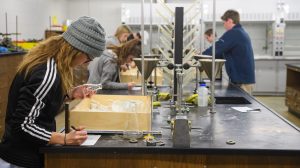
The Department of Chemistry and Biochemistry has attracted several top female honors students to the program through its biochemistry emphasis. Photo by Robert Jordan/Ole Miss Communication
OXFORD, Miss. – Mixing people, like chemicals, can yield either victorious or violent results. The Department of Chemistry and Biochemistry at the University of Mississippi has done so successfully and recently was nationally recognized for its achievements.
The American Chemical Society presented the department with its Stanley C. Israel Regional Award for Advancing Diversity in the Chemical Sciences for the Southeastern Region. The department received a plaque and $1,000 to continue its efforts.
“We are honored that the department’s long-term and continued commitment to increasing diversity in a central STEM discipline has been recognized with this significant award,” said Greg Tschumper, chair and professor of chemistry and biochemistry.
The nomination package submitted by the UM local section of ACS included a number of accolades, which were the direct result of the department’s longstanding efforts to increase participation of women and underrepresented minorities in chemistry. Of particular note was the hiring of Davita Watkins, the department’s first African-American woman as an assistant professor, in 2014.
Three recent African-American graduates, Margo Montgomery-Richardson, Kari Copeland and Shana Stoddard, were hired as assistant professors at Alcorn State University, Allen University and Rhodes College, respectively.
Also, a former summer program participant, Sharifa T. Love-Rutledge, who at the time was a Tougaloo College undergraduate, made history by becoming the first African-American woman to earn a chemistry degree at the University of Alabama.
Overall, five African-Americans and one Hispanic, three of whom are women, earned their chemistry doctorates from the Ole Miss chemistry department over a one-year period in 2012-13.
Other notable achievements include a graduate population that has maintained a 30 percent to 50 percent female and a 10 percent to 15 percent minority rate over the past five years and an undergraduate forensic chemistry program where 76 percent of the majors are women.

The Department of Chemistry and Biochemistry has produced several African-American doctoral graduates in recent years, including (front row, from left) Shana Stoddard, Kari Copeland, Jeffrey Veal and Margo Montgomery. Also shown (back row, from left) are professors Greg Tschumper, Walter Cleland, Steven Davis and Maurice Eftink. Submitted photo
“The department has vigorously adopted a number of new strategies to recruit underrepresented students into the chemistry program,” said Nathan Hammer, associate professor of chemistry and biochemistry.
“There is a new awards celebration, which, in 2015 alone, recognized 32 female undergraduate chemistry students. The department has implemented a ‘welcome to school’ picnic for undergraduate chemistry students, which also has increased the number of women and minority chemistry majors.”
Further, the department recently modified its ACS-accredited Bachelor of Science in Chemistry program to have an optional biochemistry emphasis to attract pre-med students, which resulted in women becoming nearly half those majors.
Katrina Caldwell, UM vice chancellor for diversity and community engagement, commended the department for its efforts and subsequent recognition.
“Congratulations to the department for receiving this honor,” Caldwell said. “Your efforts will contribute greatly to the university’s demonstrated commitment to diversity and equity.”
The Department of Chemistry and Biochemistry has more than 500 undergraduate chemistry majors and nearly 50 graduate students. It offers Bachelor of Arts, Bachelor of Science, master’s and doctoral degrees.
The UM local section of the ACS in north Mississippi encompasses 21 counties. The chapter’s goals focus on meaningful social and professional relationships between chemistry-related professionals including high school and college students, teachers at all levels of the chemical sciences and professional chemists.
For more information about the Department of Chemistry and Biochemistry, visit http://chemistry.olemiss.edu/.